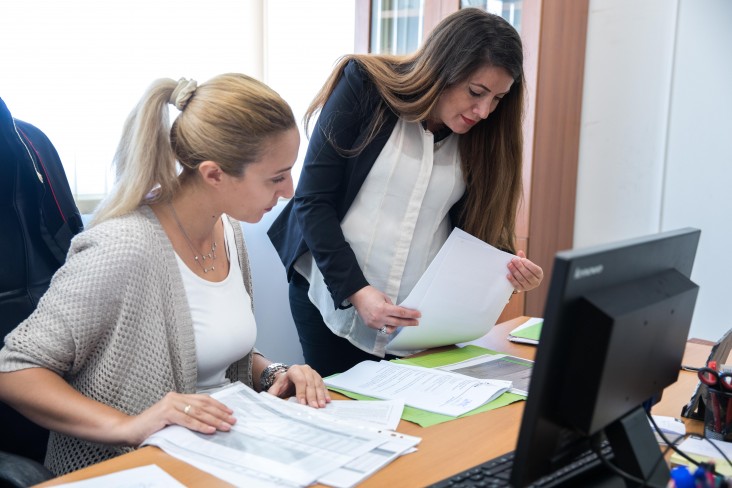
September 2017—Besnike Miftari and her team are busy reviewing and analyzing the piles of court cases that have landed on their desks. It’s a task that comes with a reward.
With the support of USAID’s Justice System Strengthening Program, 16 recent law school graduates were given the opportunity to work alongside judges as legal clerks in Kosovo’s courts to help conduct research, draft decisions, and move cases through the system. In turn, judges serve as mentors for the next wave of judicial employees, while receiving critical assistance from these young professionals in closing years-old cases.
“For now, this is the best thing that I can do,” said Miftari of the two-year clerking program. “The judges consider us as equal." She noted that her work provides the ideal training ground to obtain a long-term court position. “When you close an old case, there’s a sense of willpower when you know that you contributed to the closing of cases that are more than 10 years old,” she added.
Already, five clerks who participated in the program are joining Kosovo’s courts in different capacities, thanks to the training they received through USAID in case management, backlog reduction, and legal drafting as well as the opportunity to apply their knowledge in real life.
One of these young professionals is Festa Zherka. After participating in the program at the Basic Court in Gjakova, she was recently promoted to train up to 250 court and prosecutorial staff on how to use an automated case management system that is being rolled out in Kosovo’s courts.
“We worked closely with the judges and we were also able to participate in court hearings,” she said. “I saw the real situation.”
Finding talented young professionals like Miftari and Zherka is vital for the future of Kosovo’s judiciary. In the next few years, 30 percent of Kosovo’s judges are expected to leave the courts through retirement.
Gazmend Bytyqi, who clerked at the Basic Court in Ferizaj and is on the path to becoming a judge, says the skills he developed in the program helped him get where he is today. “Now I feel comfortable to handle any [civil] case,” he said. “I have gained the trust and confidence from the court.”
The four-year Justice System Strengthening Program, which began in January 2016, builds upon USAID’s prior efforts to advance the rule of law in Kosovo and ensure that the justice system operates in a professional, efficient and accountable manner.
LINKS
Follow @USAIDKosovo, on Facebook, on YouTube







Comment
Make a general inquiry or suggest an improvement.